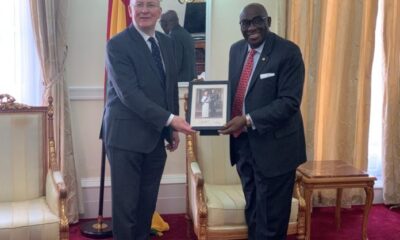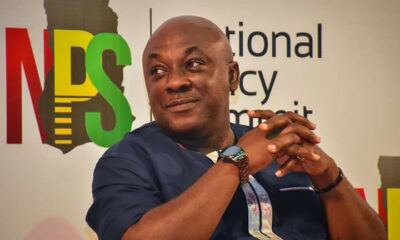Published
5 years agoon
By
Frimpong
Britain’s prime minister, Boris Johnson, who was hospitalized with persistent coronavirus-related symptoms, was moved to intensive care on Monday after his condition worsened, his office said.
Mr. Johnson has asked the foreign secretary, Dominic Raab, to stand in for him if necessary, 10 Downing Street added in a statement, but aides said that Mr. Johnson remained conscious.
“Over the course of this afternoon, the condition of the Prime Minister has worsened and, on the advice of his medical team, he has been moved to the Intensive Care Unit at the hospital,” the statement said.
“Boris Johnson’s Condition ‘Worsened,’ British Foreign Secretary Says.
In a recorded statement, Britain’s Foreign Secretary, Dominic Raab, said Prime Minister Boris Johnson asked Mr. Raab to stand in for him if needed.
Since Sunday, the prime minister’s been under the medical care of the team at St. Thomas’s hospital after he was admitted with persistent coronavirus symptoms — during the course of this afternoon, the prime minister’s condition worsened. And on the advice of the medical team, he was moved in to a critical care unit. So in light of those circumstances, the prime minister asked me as first secretary to deputize for him where necessary in driving forward the government’s plans to defeat coronavirus. The prime minister is in safe hands with the brilliant team at St. Thomas’s hospital, and the focus of the government will continue to be on making sure — at the prime minister’s direction — all the plans for making sure that we can defeat coronavirus and pull the country through this challenge, will be taken forward.
Mr. Johnson’s aides said that he had been moved to the intensive care unit as a precaution, in case he requires a ventilator to aid his recovery.
The prime minister was admitted to St Thomas’ Hospital in central London on Sunday night, suffering from persistent symptoms of the virus, including a high temperature and a cough.
Downing Street said that the decision to move him to intensive care was made by his medical team after his condition worsened Monday afternoon and that he was transferred around 7 p.m.
Earlier Monday, British officials had given assurances that he was healthy enough to run the country, but there was growing unease over the lack of information on his condition.
Mr. Johnson wrote Monday on Twitter from a hospital in London that he was “in good spirits.”
Mr. Johnson, 55, first experienced the symptoms of the virus on March 26, was tested that day and received the positive result around midnight, going into self-isolation in Downing Street, but chairing meetings by videolink.
He was originally expected to resume normal working at the end of last week, but on Friday Mr. Johnson’s aides said that he still had symptoms, especially a high temperature, and had not ended his self-isolation. In a video statement in which he explained the situation, he still looked unwell.
Several other key figures in the government have self-isolated after suffering symptoms of the coronavirus, including the health secretary, Matthew Hancock, who has now returned to work, and the chief medical officer, Chris Whitty. Mr. Johnson’s partner, Carrie Symonds, who is pregnant, disclosed on Saturday that she, too, is suffering symptoms.
Mr. Johnson was initially criticized for his slow response to the outbreak, but later moved to place Britain under a virtual lockdown, closing all nonessential shops, banning meetings of more than two people, and requiring people to stay in their homes, except for trips for food or medicine.
Before that his government had tried to take a different tack from the rest of Europe, which moved earlier to close businesses to try to halt the spread of the virus. Some officials, including Sir Patrick Vallance, England’s chief scientific adviser, had said that the government was looking “to build up some kind of herd immunity so more people are immune to this disease and we reduce the transmission.”
At one news conference in early March, Mr. Johnson described visiting a hospital where he said there were coronavirus patients. “I shook hands with everybody, you’ll be pleased to know,” he said, “and I continue to shake hands.”
The announcement of Mr. Johnson’s hospitalization came hours after Queen Elizabeth II issued a rare televised address on Sunday, attempting to rally her fellow Britons to confront the pandemic with the resolve and self-discipline that have seen the nation through its greatest trials.
According to statistics released on Monday more than 51,000 people had tested positive for the virus in Britain and 5,373 people had died, though there was some cause for optimism from figures that showed the rate of hospital admissions slowing.


Reject Ghana’s Agyapa deal – Transparency International to UK authorities


Forgive me, I’ve no evidence over £26m money laundering claims – Inusah Fuseini


No gov’t official arrested in UK – Oppong Nkrumah


Papa Owusu-Ankomah ends duty tour of UK, Ireland


Watch Video: Family arrives back in the UK from holiday and discovers 2 Africans hiding in their car roof rack


“Carlos Ahenkora was never in the ICU” – Close friend

























